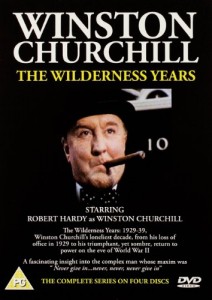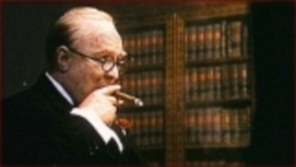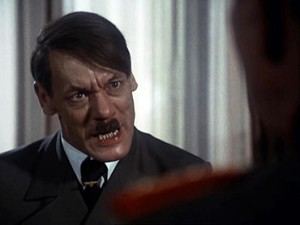Robert Hardy’s “Wilderness Years”
 5 October 2015: Turning 90 this month and as vivacious as ever, Timothy Robert Hardy spoke tonight on “My Life with Churchill” at a Hillsdale College Churchill seminar, attended by over 500 registrants and 200 students, sponsored by Hillsdale’s Center for Constructive Alternatives. That afternoon I had the privilege to play Alistair Cooke, and introduce four excerpts from Tim’s inimitable portrayal in the documentary, “Winston Churchill: The Wilderness Years.” Here is the introduction to the first excerpt, which may be viewed on YouTube (first 12 minutes). All four excerpts will be published later by The Churchill Project for the Study of Statesmanship.
5 October 2015: Turning 90 this month and as vivacious as ever, Timothy Robert Hardy spoke tonight on “My Life with Churchill” at a Hillsdale College Churchill seminar, attended by over 500 registrants and 200 students, sponsored by Hillsdale’s Center for Constructive Alternatives. That afternoon I had the privilege to play Alistair Cooke, and introduce four excerpts from Tim’s inimitable portrayal in the documentary, “Winston Churchill: The Wilderness Years.” Here is the introduction to the first excerpt, which may be viewed on YouTube (first 12 minutes). All four excerpts will be published later by The Churchill Project for the Study of Statesmanship.
——————————————————
“In High Places”: Munich, 1932
In “The Wilderness Years,” Robert Hardy faithfully captures Martin Gilbert’s image of Churchill in the Thirties: politically frustrated, less than effective as a father and a husband, worried over ominous developments in Germany—yet also enjoying his most productive decade as a writer and historian.
This defining excerpt is set in Munich on 30 August 1932, before Hitler gains power, as Churchill comes as close as he ever will to meeting Hitler face to face—amid sobering scenes of marching, chanting brownshirts singing Die Horst Wessel Lied.
 Churchill has been touring the Danubian battlefields of the First Duke of Marlborough, whose biography he is writing. He is accompanied by his wife Clementine (Sian Phillips), their son Randolph (Nigel Havers), their daughter Sarah (Chloe Salaman), his close friend Frederick Lindemann, “The Prof” (played by David Swift). With them are Brigadier Packenham-Walsh who is drafting maps for Marlborough, and his wife (known to Churchill as “Mrs. P-W”).
Churchill has been touring the Danubian battlefields of the First Duke of Marlborough, whose biography he is writing. He is accompanied by his wife Clementine (Sian Phillips), their son Randolph (Nigel Havers), their daughter Sarah (Chloe Salaman), his close friend Frederick Lindemann, “The Prof” (played by David Swift). With them are Brigadier Packenham-Walsh who is drafting maps for Marlborough, and his wife (known to Churchill as “Mrs. P-W”).
At the hotel they are met by Randolph’s acquaintance and Hitler’s foreign press secretary, Harvard-educated Ernst “Putzi” Hanfstaengl (played very accurately by Roger Bizley). Putzi hopes to introduce Churchill to his boss.

Writer-director Ferdinand Fairfax takes liberties to shorten and dramatize what actually happened. Hitler (a very grim-looking Gunter Meisner) is shown in evening dress, apparently ready to sit down with the Churchills. But first he watches furtively from a distance, and then balefully gazes through the restaurant window, catching the eye of the ever-curious Prof, who signals Hanfstaengl. Putzi tries to fetch Hitler, but is furiously turned away.
Here is what really happened. Hanfstaengl left the restaurant in mid-meal in search of the Fuhrer, who he found near his Munich apartment. “Herr Hitler,” he said, “don’t you realise the Churchills are sitting in the restaurant?…They are expecting you for coffee and will think this a deliberate insult.” Hitler said he was unshaven and had too much to do. “What on earth would I talk to him about?,” he added. “They say he is a rabid Francophile. What part does Churchill play? He is in opposition and no one pays any attention to him.” Hanfstaengl replied: “People say the same about you.”
Fairfax neatly gets around all this with the brief, dramatic scene we see here. True to fact, Churchill makes his famous declaration about the pitfalls of anti-Semitism, not to Hitler, but to his press secretary.
Putzi Hanfstaengl is considered reliable. Suave and westernized, he tried to exert a moderating influence, but fell out of favor in 1936. Suspecting he was marked for assassination by Goebbels, he left Germany in 1937 and wound up in the United States, where he advised Roosevelt on the Nazi regime. The anecdote is based on his 1957 book, Hitler: The Missing Years, and corroborates Churchill’s The Gathering Storm.
“Thus Hitler lost his only chance of meeting me,” Churchill cutely wrote. In the film he says he would be glad to meet Hitler in London, but alas the Fuhrer—er—never quite got there. “Later on, when he was all-powerful,” Churchill added, “I was to receive several invitations from him. But by that time a lot had happened, and I excused myself.”
This episode begins with a poignant scene between Winston and Clementine which neatly defines their marriage—one of deep mutual devotion, but needing periods of separation from time to time, lest the high-strung Clemmie collapse from the pressure. Winston longs for a closer relationship; Clementine says he should have married Goonie (Lady Gwendolyne Bertie, his sister-in-law). She wishes he would be content with things as they are.







3 thoughts on “Robert Hardy’s “Wilderness Years””
All four excerpts, with my intros, and videos of the other Churchill presentations at Hillsdale, will be published on the Churchill Project site http://winstonchurchill.hillsdale.edu
I remember the Hardy series and that particular scene with Hitler. Hardy was great. It was an intelligent and well-acted series. I hope you do post more Hillsdale material on Churchill and the speakers there. I sure they will be fascinating and informative.
Mr. Langworth, The October 5th presentations during the Hillsdale CCA program were phenomenal and most inspiring. Churchill’s magnanimity and resolve during such a perilous crisis serves as object of emulation for us young people today as we set forth to combat the equally perilous crises of our own time. We are constantly reminded through our study of Churchill to “Never Flinch. Never Weary. Never Despair,” in the midst of great adversity and overwhelming hardship.
Also, thank you for joining Mr. Randy Otto and the men of the Republic’s Finest Hour for cigars after the lecture. We all greatly appreciated your company.